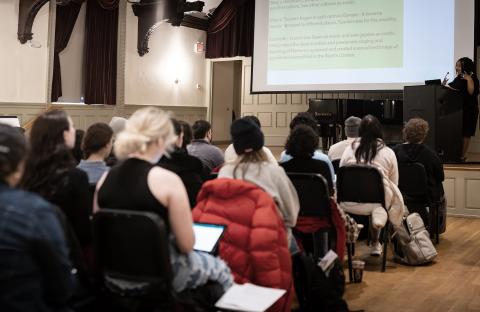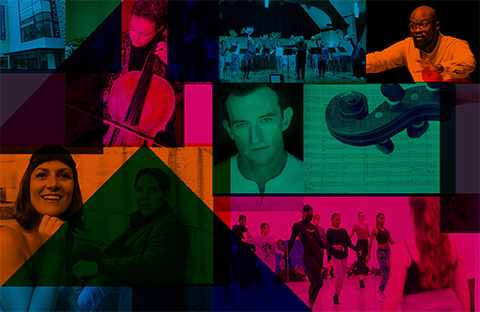A Culture Bearer in the Classroom

When vocalist and ethnomusicologist Maya Cunningham was 16, she sang for famed jazz musician Wynton Marsalis. The opportunity came about when Marsalis visited the Duke Ellington School of the Arts in Washington, D.C., where Cunningham was a student. After hearing her sing Wayne Shorter’s “Footprints,” Marsalis gave Cunningham advice that became a fresh wind to guide her sails: “You need to get in touch with the blues.”
She took Marsalis’s note as a challenge: “I started to investigate African American recordings of blues, which led me to early African American recordings in the Smithsonian collection.” Her interest may have been rooted in performance, but the education she gained flourished in another way. “I was always interested in the academic study of music as well as the performance [of it],” she says. “The two go hand in hand.”
Soon after graduating from Howard University with a B.M. in jazz studies, Cunningham moved to New York City, where she toured and performed with jazz heavyweights, including a performance of Max Roach's Freedom Now Suite at Jazz at Lincoln Center. Cunningham then began balancing singing with scholarship. She pursued an M.A. in jazz performance, followed by an M.A. in ethnomusicology. She’s now finishing her Ph.D. in African and African American music.
Through it all, she’s operated as a culture bearer with a decolonial mission—a role that’s become especially important in the arena of music history. Most recently, she’s carried that torch through her contributions to the design and, now, teaching of Boston Conservatory’s new Music in Context course, which launched in September 2022 as part of the school’s required undergraduate music history sequence.
While music history often traces the art form’s development through a predominantly Western perspective, the Music in Context course disrupts that narrative and incorporates more cultures, traditions, and lineages. Cunningham was a natural fit for the charge.
“Boston Conservatory’s Core Music Studies Department has been working on bringing this course to fruition since 2020,” she explains. Jonathan Bailey Holland, who was then chair of core studies, worked with the department to ideate a broader approach to history. Once that was approved, he invited Cunningham to apply and teach it. “When I came on board, I developed the short summary of what [the course] would be into a full curriculum,” she says.
Music in Context explores world music cultures, including those of Mali, Botswana, Indonesia, and China, and traces the ways in which each has influenced U.S. popular music. For music like jazz and blues, Cunningham wants her students to understand the intrinsic “Africanity” in the origins of each genre. “We are working on engaging with the aesthetics that came in with enslaved Africans, and why and how they chose to shape the music traditions that developed here,” she explains. “That’s a perspective we’re getting at from many angles.”
Cunningham’s background lends itself to the mission of Music in Context. Long before pursuing graduate studies, she taught music to fourth- and fifth-graders. She began encouraging her predominantly African American students to develop a more robust understanding of their musical heritage. “I began to teach them the music of the Mali empire,” she says. The experience also fostered her interest in ethnomusicology.
Since then, Cunningham has found her niche in the overlapping spheres of art and academia. “I’m really committed to an activist ethnomusicology,” she explains. “To be a part of that effort at Boston Conservatory, it’s a quiet activism. It’s the kind that impacts students directly. It helps to shape their thinking and will carry them through the rest of their education.”
The course has resonated with students. “They seem to be super engaged,” says Cunningham. “Their minds are ready—they’re fertile ground for this kind of construction.” As an academically informed performer teaching performance students, Cunningham has had a unique opportunity to integrate that perspective into the classroom. “I have insider knowledge of many of these traditions, [and I] have spent time with musicians from other traditions that I’m teaching,” she explains.
Cunningham recently invited Amadou Kouyate, who performs Senagalese and Malian music on the kora, to speak with her students via Zoom. His presence resonated beyond the curriculum. “I had one student who wanted to compose a piece for the instrument he plays,” she says, “so they’re engaging with it from the perspective of performance practitioners as well.”
In Cunningham’s hands, Music in Context is an occasion to broaden students’ minds and encourage new culture bearers.
“All of it is really a privilege," she says.
READ: STAGES 2022–2023

“A culture bearer in the classroom" first appeared in the 2022–2023 issue of STAGES, Boston Conservatory's annual magazine.
